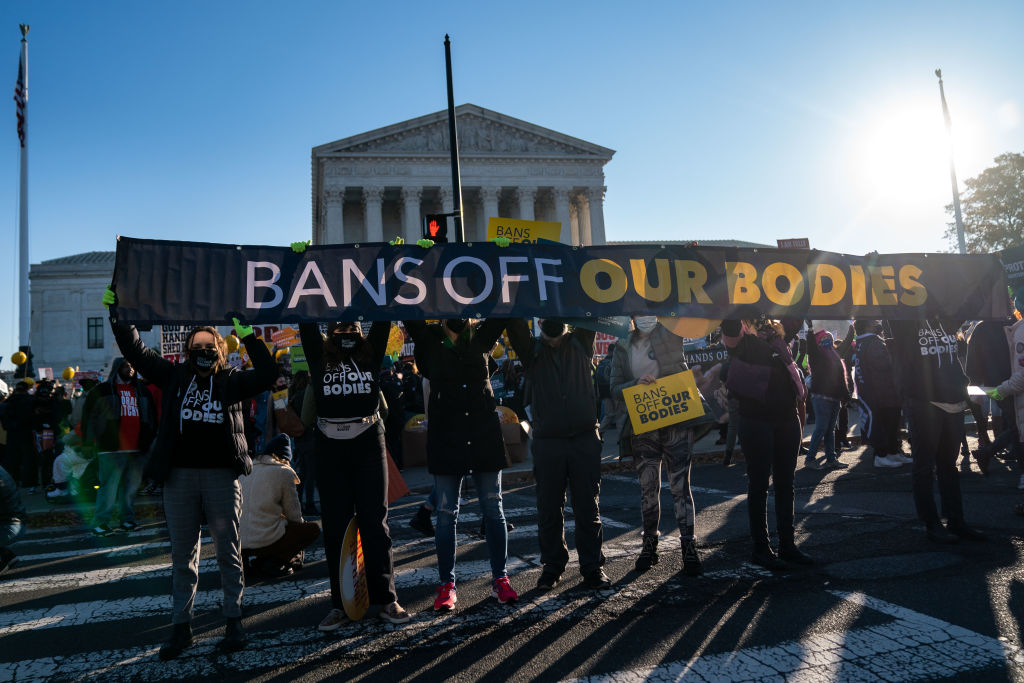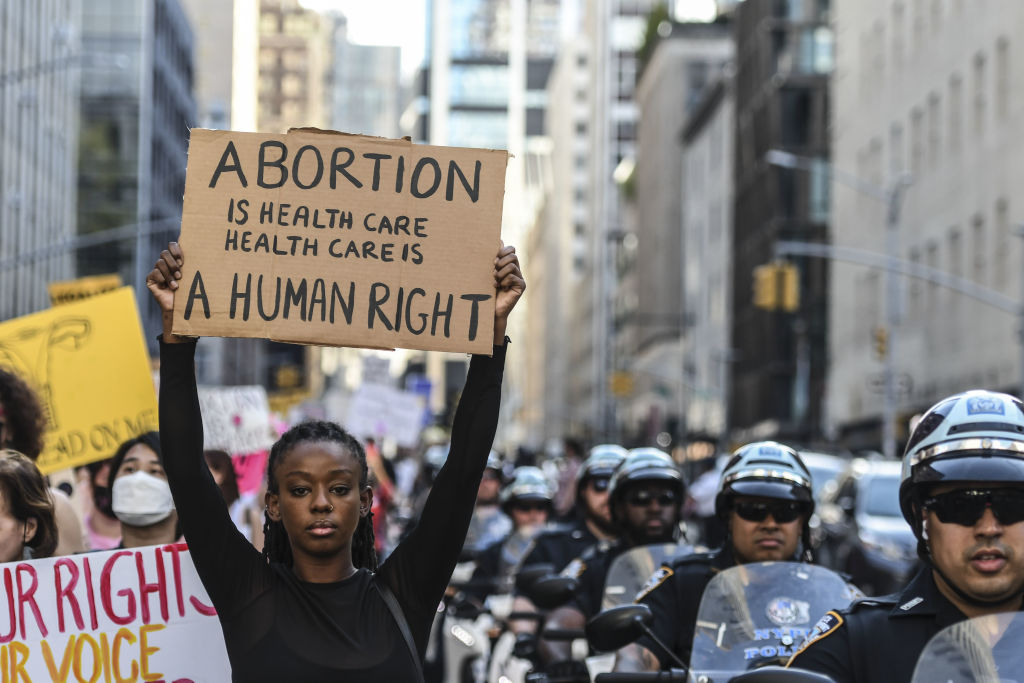
Source: Kent Nishimura / Getty
A recent case out of Texas involving a young woman criminally charged for an alleged self-managed abortion put a spotlight on how anti-abortion restrictions and sentiments can create a hostile environment for women and other pregnant people. Lizelle Herrera should have been given the space and privacy to manage a personal health event but instead was thrust into the spotlight and dragged through the criminal legal system.
Breaking News!!! Lizelle has been released on bail and has secured legal counsel. With permission from her family, Frontera Fund has started a legal defense and reconciliation fund to support Lizelle and her family.
Donate herehttps://t.co/BgqPHA4NON#Justice4Lizelle
— Frontera Fund (@LaFronteraFund) April 9, 2022
Charges against Lizelle have been dropped, but the fact remains that the rush to criminalize Black and Brown women’s decision-making about their bodies has intensified in the past several years. And while some suggest Lizelle’s case wasn’t necessarily a result of the extreme anti-abortion law enacted last fall, the law’s passing created an atmosphere that seems to increasingly support criminalizing the end of pregnancy.
The Texas case is just the latest attempt by legal authorities to criminalize a pregnancy outcome. As Yellowhammer Fund Executive Director Laurie Bertram Roberts highlighted on Instagram there is a history of Black and other people of color being criminalized for pregnancy outcomes. Roberts noted that even searching for abortion pills has been used to try to criminalize people in the past.
But ask any organizer focusing on reproductive rights and abortion, and they will tell you that the recent attacks on the right to abortion are not new. States have been trying to pass restrictive measures to limit abortion access since the landmark Supreme Court case Roe v. Wade became law.
Last week, the Oklahoma legislature passed an extreme anti-abortion law that nearly restricts all abortions. Rabia Muqaddam, senior staff attorney at the Center for Reproductive Rights, called the Oklahoma law “patently unconstitutional.”
“If allowed to take effect, it would severely impact people’s health and well-being in the state and the entire region,” Muqaddam told NewsOne. “Lawmakers often defend abortion restrictions as necessary to protect pregnant people’s health, but the reality is that they inflict significant harms on communities.”
States with severe abortion restrictions often lack adequate maternal health care. According to Muqaddam, Black women in Oklahoma were two-and-a-half times more likely to die of birth or pregnancy-related complications than white women between 2004 and 2018.
“Most people seeking abortions are low-income and already struggle to access healthcare generally,” she continued. “Being denied an abortion imposes substantial medical risk, as carrying a pregnancy to term is far riskier than abortion. People forced to carry their pregnancies to term face life-threatening risks, including preeclampsia.”
Along with Texas, Mississippi has been at the center of the fight to protect the right to abortion. A decision in the Supreme Court case Dobbs v. Jackson Women’s Health Organization is expected sometime this spring and could have wide implications on the right established in Roe. The Center for Reproductive rights notes that Mississippi ranks 50th among states for overall women and children’s health, but “it is about 75x more dangerous to carry a pregnancy to term than to have an abortion.
Choosing whether to end or continue with a pregnancy should be an individual’s protected and respected right. And being able to get medical treatment, in either case, should not come with the fear of possible incarceration.
Breana Lipscomb, senior advisor for Maternal Health & Rights at the Center for Reproductive Rights, further explained the potential harm abortion restrictions cause those who choose to carry pregnancies to full term.
“Pregnancies can end at any stage, for a variety of reasons,” Lipscomb explained. “The health care options that are provided to people seeking abortion and people seeking treatment for miscarriage and other pregnancy-related complications are often the same. Abortion restrictions harm pregnant people in all of these situations.”
It is unclear how or why the hospital where Lizelle was treated reported her to local authorities. Still, the presence of anti-abortion laws and policies can put medical professionals in a position where they have to prioritize the law over the health and well-being of a patient in need. In Lizelle’s case, there was no legal justification for reporting her to officials, her arrest or subsequent charges. Yet, the fear of compliance can drive people to cause harm instead of care.
“Pregnant people themselves may hesitate to seek health care services for miscarriages or obstetric emergencies out of fear that they will be criminalized or punished,” Lipscomb said. “With abortion services restricted or banned, pregnant people experiencing complications or pregnancy losses may be forced to travel long distances and even across multiple state lines just to access appropriate care.”
Heading into Black Maternal Health Week, it is important to listen to Black women as they discuss their own experiences and needs and amplify the conversation around community-driven solutions and care. Earlier this year the National Birth Equity Collaborative, Black Mamas Matter Alliance, Sister Song, Black Women’s Health Imperative, and In Our Own Voice: National Black Women’s Reproductive Justice Agenda put out a reproductive justice call to action on the 49th anniversary of Roe calling for an “anti-racist and gender-inclusive model of health care.”
Policies should center health and well-being not exacerbate harm.
“People should be able to access essential healthcare and make deeply personal decisions about their health and their families free from political interference,” Lipscomb said. “Access to reproductive healthcare—whether abortion care or maternal healthcare—is critical for societies to prosper and thrive. Everyone, everywhere deserve the right to decide what is best for their bodies and health.”
Disclaimer courtesy of Renee Bracey Sherman: If you or anyone you know needs assistance self-managing a miscarriage or abortion, please call the Miscarriage + Abortion Hotline at (833) 246-2632 for confidential medical support or the Repro Legal Helpline at (844) 868-2812 for confidential legal information and advice.
SEE ALSO:
Black Women-Led Organizations Launch Reproductive Justice Agenda On 49th Anniversary of Roe. v. Wade
Abortion Justice Marches Leverage National Network In Support Of State And Local Organizing
Black Women On Roe v. Wade: ‘Now’s The Time To Ensure Equity, Not Just Access’
window.addEventListener(‘interaction’, function () {
setTimeout(function () {
var s = document.createElement(‘script’), el = document.getElementsByTagName(‘script’)[ 0 ];
s.async = true;
s.src = ‘https://platform.twitter.com/widgets.js’;
el.parentNode.insertBefore(s, el);
}, 1000)
});

